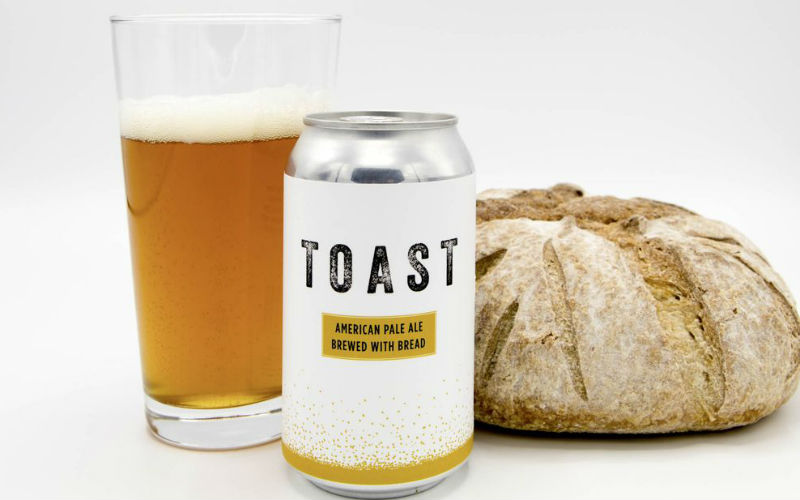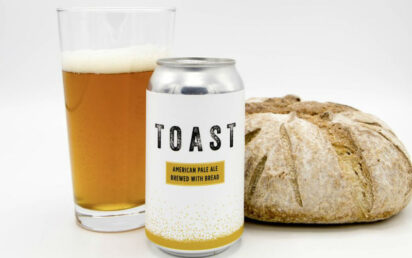A craft ale start-up with a social conscience has fed more than 30,000 vulnerable people after pivoting during lockdown.
Toast Ale, based in Southwark, London, is a ‘planet-saving’ craft beer brewed using surplus fresh bread that would otherwise be wasted. Since it was founded in 2015 it has used almost two million slices in the brewing process, while all its profits go to charities fixing the food system.
Food production is the biggest contributor to climate change but one-third of all food is wasted.
Toast’s mission is to change that by replacing virgin barley with surplus bread, reducing the demand for land and water. It claims to have avoided 42 tons of CO2 emissions and saved 238,000 litres of water through its approach.
However with around 70 per cent of sales to pubs, restaurants and events, it had to quickly change approach when the UK went into lockdown.
“COVID-19 has had a huge impact on the business,” COO Louisa Ziane told BusinessCloud.
“Toast Ale is stocked in retailers including Tesco, Waitrose, Co-op and Ocado, but orders are unpredictable at the moment [so] we relaunched our website with an improved webshop, offering free delivery.”
To reduce costs it placed five staff, who are “keeping busy” with voluntary work, on furlough – more than half its total workforce.
It also created a ‘Meal Deal’, where every beer purchased funds a meal for someone in need. Most of the meals use surplus food.
“We’re now donating every penny of proceeds from beers bought from our online shop towards getting food to those who need it most during the COVID-19 crisis,” the business said.
“Every single can or bottle of Toast you buy online will fund a meal for someone who’s especially vulnerable now.”
So far enough has been raised to feed more than 30,000 people.
Papersmiths
Another business to make drastic changes and move online during COVID-19 is premium stationery business Papersmiths.
Its journey began in 2013 when it split its design studio space in two, creating a shop front with just £500. By 2014, the team had outgrown the space and began to expand. It now has bricks-and-mortar stores in Brighton, Bristol and London.
However it recently had to close its physical stores and furlough all 33 employees.
The brand has almost 50,000 followers on Instagram inspired by founder Sidonie Warren’s quest to bring the best designs from around the world to the UK. However to keep the business alive, Warren is currently manning a one-woman operation, fulfilling orders through both the Papersmiths site and eCommerce platform Trouva from her spare bedroom.
She cycles to the London stores each week to pick up extra stock.
London Fermentary
Another business to adapt to life under lockdown is London Fermentary.
The start-up, which employs four people, is a fermentation specialist making probiotic food and beverages. It also runs workshops and talks on fermentation.
London Fermentary will soon be launching produce boxes for delivery in London, and have already started a collection service. The brand is also sharing classes on how to make healthy and delicious probiotic food at home on Instagram.
It told BusinessCloud it has seen a massive shift in food chain supply, wholesale and retail, which is keeping it very busy, and is even hiring due to high demand in fermented foods from retailers – mainly independent grocery shops and bakeries across the country.
Hotpod Yoga
An online move was crucial to keeping Hotpod Yoga, the brainchild of yoga teacher Nick Higgins and strategy consultant Max Henderson, moving during lockdown.
Launched in 2013 with a mission to ‘reinvent yoga for the modern world’, the Brixton business claims to be Europe’s largest yoga company with 75 locations in the UK and several in other countries.
With all of its studios closed due to the lockdown, Hotpod moved to offer virtual classes with optional payments for classes between £0-10.
The firm, which has 25 permanent employees and 100 freelancers, also launched Hotpod Home – an on-demand platform featuring pre-recorded classes and exercises.
Erpingham House
Vegan restaurant Erpingham House has moved to an online communication model for its streamlined staff.
It says the idea for the original restaurant in Norwich was born from a desire to create a multi-dimensional space, a home from home, that could be enjoyed by people throughout the day and help promote sustainable, health-conscious food and drinks.
With branches in Brighton and Norwich, it has been forced to reduce its workforce from 36 to 22 and turn to tech for communication.
“The team at Erpingham House are invited to weekly mediation sessions which would normally run in-house but have gone online for now,” founder Loui Blake told us.
“There’s also constant communication with two weekly team meetings where experts such as accountants are invited to join helping to demystify government schemes and other helpful initiatives.”
Accountancy platform Xero is helping these companies accurately understand cash flow; pay staff; and identify employees as furloughed


